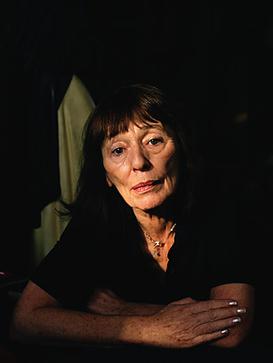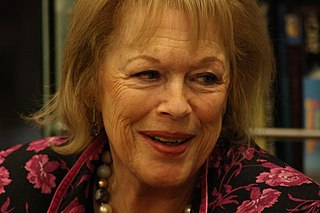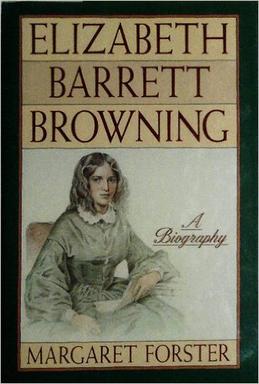
Adeline Virginia Woolf was an English writer. She is considered one of the most important modernist 20th-century authors. She pioneered the use of stream of consciousness as a narrative device.

Dame Millicent Garrett Fawcett was an English political activist and writer. She campaigned for women's suffrage by legal change and in 1897–1919 led Britain's largest women's rights association, the National Union of Women's Suffrage Societies (NUWSS), explaining, "I cannot say I became a suffragist. I always was one, from the time I was old enough to think at all about the principles of Representative Government." She tried to broaden women's chances of higher education, as a governor of Bedford College, London and co-founding Newnham College, Cambridge in 1875. In 2018, a century after the Representation of the People Act, she was the first woman honoured by a statue in Parliament Square.

Dame Beryl Margaret Bainbridge was an English writer. She was primarily known for her works of psychological fiction, often macabre tales set among the English working class. She won the Whitbread Awards prize for best novel in 1977 and 1996, and was nominated five times for the Booker Prize. She was described in 2007 as a national treasure. In 2008, The Times named Bainbridge on their list of the "50 greatest British writers since 1945".

Lady Antonia Margaret Caroline Fraser, is a British author of history, novels, biographies and detective fiction. She is the widow of the 2005 Nobel Laureate in Literature, Harold Pinter (1930–2008), and prior to his death was also known as Lady Antonia Pinter.

Dame Margaret Drabble, Lady Holroyd, is an English biographer, novelist and short story writer.

Vera Mary Brittain was an English Voluntary Aid Detachment (VAD) nurse, writer, feminist, socialist and pacifist. Her best-selling 1933 memoir Testament of Youth recounted her experiences during the First World War and the beginning of her journey towards pacifism.

Zadie Smith FRSL is an English novelist, essayist, and short-story writer. Her debut novel, White Teeth (2000), immediately became a best-seller and won a number of awards. She became a tenured professor in the Creative Writing faculty of New York University in September 2010.

Margaret Forster was an English novelist, biographer, memoirist, historian and critic, best known for the 1965 novel Georgy Girl, made into a successful film of the same name, which inspired a hit song by The Seekers. Other successes were a 2003 novel, Diary of an Ordinary Woman, biographies of Daphne du Maurier and Elizabeth Barrett Browning, and her memoirs Hidden Lives and Precious Lives.
Adrian Albert Mole is the fictional protagonist in a series of books by English author Sue Townsend. The character first appeared as part of a comic diary featured in a short-lived arts magazine published in Leicester in 1980, and shortly afterward in a BBC Radio 4 play in 1982. The books are written in the form of a diary, with some additional content such as correspondence. The first two books appealed to many readers as a realistic and humorous treatment of the inner life of an adolescent boy, and capturing the zeitgeist of the UK during the Thatcher period.

Helen Fielding is British journalist, novelist and screenwriter, best known as the creator of the fictional character Bridget Jones. Fielding’s first novel was set in a refugee camp in East Africa and she started writing Bridget Jones in an anonymous column in London’s Independent newspaper. This turned into an unexpected hit, leading to four Bridget Jones novels, three movies, with a fourth movie announced in April 2024 for release in 2025.
Edward Hunter Davies is a British author, journalist and broadcaster. His books include the only authorised biography of the Beatles.

Howards End is a novel by E. M. Forster, first published in 1910, about social conventions, codes of conduct and relationships in turn-of-the-century England. Howards End is considered by many to be Forster's masterpiece. The book was conceived in June 1908 and worked on throughout the following year; it was completed in July 1910.
Caitlin Davies is an English author, historian, journalist and teacher. She has written several books about social history and women's history. Her historical works have focused on swimmers, female prisoners, female criminals, and female private investigators.

Dame Hilary Mary Mantel was a British writer whose work includes historical fiction, personal memoirs and short stories. Her first published novel, Every Day Is Mother's Day, was released in 1985. She went on to write 12 novels, two collections of short stories, a personal memoir, and numerous articles and opinion pieces.

Charlotte Despard was an Anglo-Irish suffragist, socialist, pacifist, Sinn Féin activist, and novelist. She was a founding member of the Women's Freedom League, the Women's Peace Crusade, and the Irish Women's Franchise League, and an activist in a wide range of political organizations over the course of her life, including among others the Women's Social and Political Union, Humanitarian League, Labour Party, Cumann na mBan, and the Communist Party of Great Britain.
Diana Athill was a British literary editor, novelist and memoirist who worked with some of the greatest writers of the 20th century at the London-based publishing company Andre Deutsch Ltd.

Edith's Diary (1977) is a psychological thriller novel by Patricia Highsmith, the seventeenth of her 22 novels. It was first published in the UK by Heinemann. One critic described it as "a relentless dissection of an unexceptional life that burns itself out from a lack of love and happiness".

Elizabeth Barrett Browning: A Biography by Margaret Forster, first published in 1988, is a biography of the English poet Elizabeth Barrett Browning, which won the Heinemann Award in 1989. Forster draws on newly discovered letters and papers that shed light on the poet's life before she met and eloped with Robert Browning, and rewrites the myth of the invalid poet guarded by an ogre-like father, to give a more-nuanced picture of an active, difficult woman who was complicit in her own virtual imprisonment. It remained the most-detailed published biography of the poet in 2003, and was one of the best known of Forster's biographies in 2016.
Jean Lucey Pratt was an English writer and bookseller. She published little during her lifetime and is best known as a diarist. Her anonymous Mass-Observation diaries written in the 1940s were featured in three popular books edited by Simon Garfield. A Notable Woman: The Romantic Journals of Jean Lucey Pratt, published in 2015, is derived from private diaries she kept between 1925 and 1986.

The statue of Millicent Fawcett in Parliament Square, London, honours the British suffragist leader and social campaigner Dame Millicent Fawcett. It was made in 2018 by Gillian Wearing. Following a campaign and petition by the activist Caroline Criado Perez, the statue's creation was endorsed by both the Prime Minister of the United Kingdom, Theresa May, and the Mayor of London, Sadiq Khan. The statue, Parliament Square's first monument to a woman and also its first sculpture by a woman, was funded through the government's Centenary Fund, which marks 100 years since some women won the right to vote. The memorial was unveiled on 24 April 2018.















